Executive Summary: Period Poverty and Equity, On Campus and Beyond
2024
Author

In 2023, with funding from the Centre for Human Rights Research (CHRR), the Faculty of Arts, and the University of Manitoba’s Strategic Initiatives Support Fund, a group of researchers affiliated with the CHRR came together to explore and address menstrual equity on campus. The “Period Poverty and Equity, On Campus and Beyond” project undertook a campus audit of washrooms to assess availability of menstrual supplies; a survey open to UM students, staff, and faculty; as well as a number of outreach events.
Working towards period equity is not as a charitable endeavour to be ameliorated by donations of period supplies; rather menstrual equity is an issue of justice. Shifting the conversation from period poverty to menstrual justice means asking that all people who menstruate be provided with the resources, tools, and infrastructure to do so with safety and dignity.

A Report on Period Poverty and Equity, On Campus and Beyond
A Report on Period Poverty and Equity, On Campus and Beyond
June 2024
Pauline Tennent, et al.
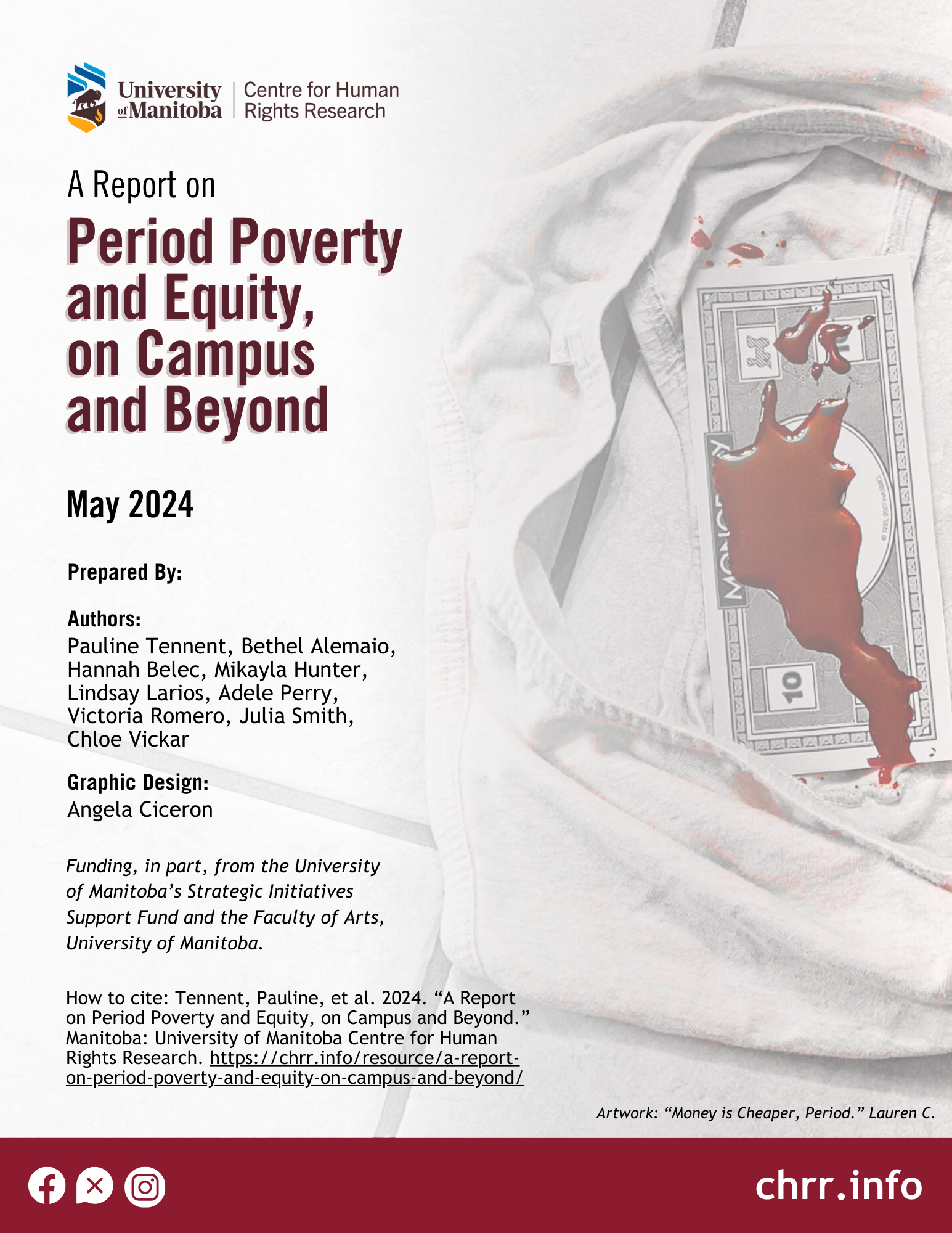
In 2023, with funding from the Centre for Human Rights Research (CHRR), the Faculty of Arts, and the University of Manitoba’s Strategic Initiatives Support Fund, a group of researchers affiliated with the CHRR came together to explore and address menstrual equity on campus. The “Period Poverty and Equity, On Campus and Beyond” project undertook a campus audit of washrooms to assess availability of menstrual supplies, a survey open to UM students, staff, and faculty, as well as a number of outreach events.
Working towards period equity is not as a charitable endeavour to be ameliorated by donations of period supplies; rather menstrual equity is an issue of justice. Shifting the conversation from period poverty to menstrual justice means asking that all people who menstruate be provided with the resources, tools, and infrastructure to do so with safety and dignity.
Related Resources
Support Us
Whether you are passionate about interdisciplinary human rights research, social justice programming, or student training and mentorship, the University of Manitoba offers opportunities to support the opportunities most important to you.
Migrant Reproductive Justice: Perinatal and abortion care with precarious immigration status with Dr. Lindsay Larios
Migrant Reproductive Justice: Perinatal and abortion care with precarious immigration status with Dr. Lindsay Larios
April 2, 2024
Dr. Lindsay Larios
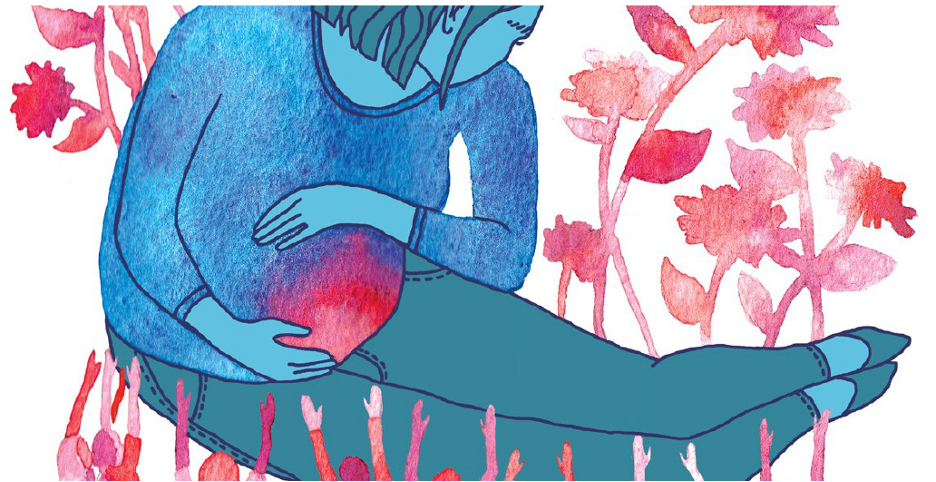
On April 2, 2024, the Centre for Human Rights Research (CHRR) hosted Dr. Lindsay Larios (UManitoba) for a seminar titled “Migrant Reproductive Justice: Perinatal and abortion care with precarious immigration status.”
Dr. Lindsay Larios is an interdisciplinary critical policy researcher and assistant professor of social work at the University of Manitoba. She studies citizenship and immigration in the Canadian context, in particular, as it intersects with family and reproductive politics and policies. Her most recent work focuses on the politics of pregnancy and childbirth and precarious migration as an issue of reproductive justice.
This seminar is a part of our annual Critical Conversations seminar series. This year, the seminar series focused on the CHRR’s research theme Reproductive and Bodily Justice and explored histories of the body, reproduction, and care in Canada and beyond.

Care Activism in Canada: Migrant Domestic Workers, Dissident Friendships and Decolonial Care
Care Activism in Canada: Migrant Domestic Workers, Dissident Friendships and Decolonial Care
March 19, 2024
Dr. Ethel Tungohan and Diwa Marcelino
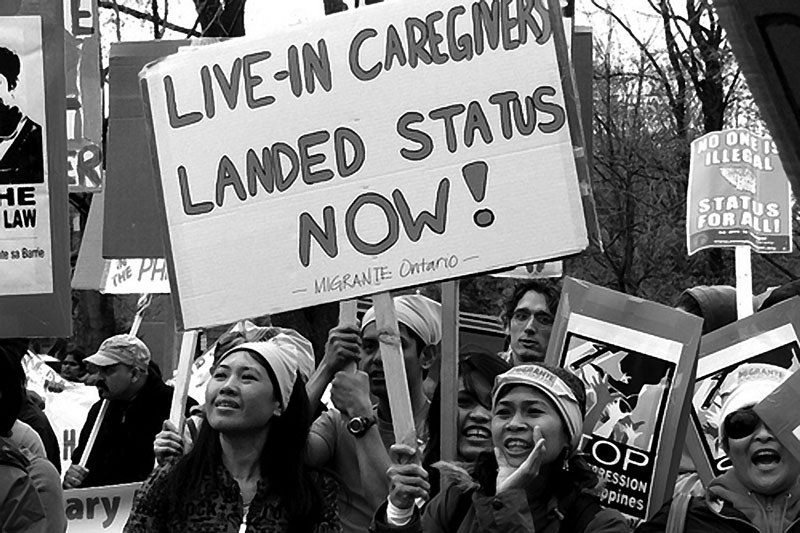
Dr. Ethel Tungohan in conversation with Diwa Marcelino, Migrante Manitoba
In collaboration with the Global College – University of Winnipeg, the Centre for Human Rights Research (CHRR) at the University of Manitoba hosted Dr. Ethel Tungohan (York University) for a seminar titled Care Activism in Canada: Migrant Domestic Workers, Dissident Friendships and Decolonial Care. Dr. Tungohan was in conversation with Migrante Manitoba representative and community organizer Diwa Marcelino.
Ethel Tungohan is a Canada Research Chair in Canadian Migration Policy, Impacts and Activism and an Associate Professor of Politics at York University in Toronto, Canada. Her book, “Care Activism: Migrant Domestic Workers, Communities of Care, and Movement Building,”, won the National Women’s Studies Association First Book Prize. Her research looks at social movements, immigration policy, social and public policy, and Canadian and comparative politics.
Diwa Marcelino is a community organizer with Migrante Manitoba, a grassroots organization advancing the rights and welfare of overseas Filipinos within the framework of peoples’ struggle for democracy, justice & peace in the Philippines. Migrante Manitoba is a founding member of Health Care for All Manitoba, an alliance advocating for expanded public health care coverage to include all residents of Manitoba regardless of status. During the Freedom Convoy occupations in 2022, he became the national project manager for the Community Solidarity Project, a civil society response to rise of the politics of division and hate. He is also a founding member of Community Solidarity Manitoba. He is also the vice-chairperson of the Council of Canadians, a grassroots organization challenging corporate power and advocating for people, the planet and our democracy. He is also a steering committee member of KAIROS, an ecumenical organization promoting ecological justice and human rights.
This seminar is a part of our annual Critical Conversations seminar series. This year, the seminar series focused on the CHRR’s research theme Reproductive and Bodily Justice and explored histories of the body, reproduction, and care in Canada and beyond.

“The Crying Need For Indian Foster Homes”: Indigenous Women Challenge State Child Welfare Practices With Sarah Nickel, PhD.
"The Crying Need For Indian Foster Homes": Indigenous Women Challenge State Child Welfare Practices With Sarah Nickel, PhD.
March 12, 2024
Dr. Sarah Nickel
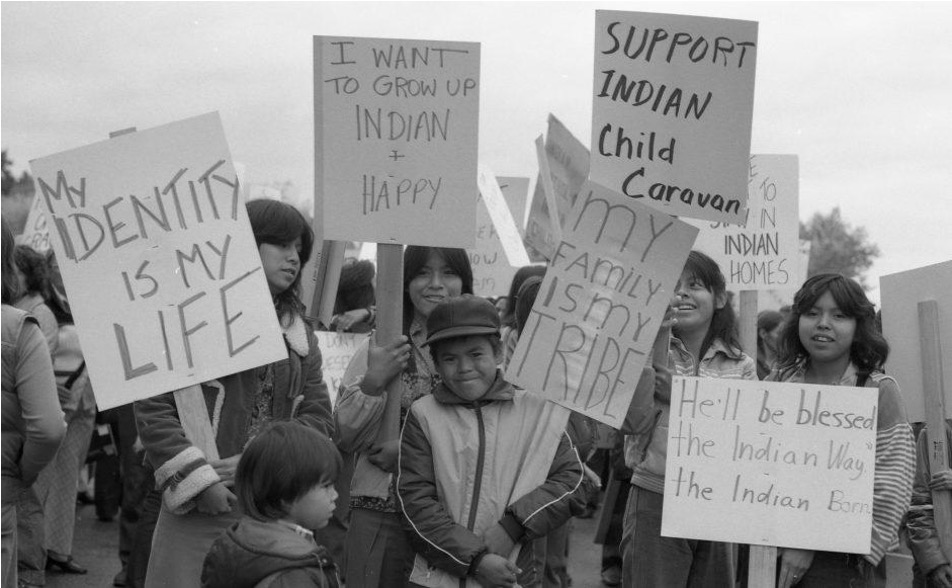
The Centre for Human Rights Research (CHRR) hosted a seminar titled “The crying need for Indian foster homes”: Indigenous Women Challenge State Child Welfare Practices with Dr. Sarah Nickel (UAlberta) on Tuesday, March 12, 2024, at 2:30 pm in 543-544 UMSU University Centre.
Sarah Nickel is Tk’emlúpsemc, French Canadian, and Ukrainian, and an associate professor of History at the University of Alberta. Her work focuses on twentieth century Indigenous politics and the gendered nature of political work drawing on community- engaged methodologies. Her first book, Assembling Unity: Indigenous Politics, Gender, and the Union of BC Indian Chiefs was published in 2019 with UBC Press and won the Canadian Historical Association’s prize for Best Book in Indigenous History in 2020. Sarah’s second monograph, Active Women: Indigenous Women’s Social and Political Work in Kanata’s West will be published with the University of Toronto Press in late 2024.
This seminar is a part of our annual Critical Conversations seminar series. This year, the seminar series focused on the CHRR’s research theme Reproductive and Bodily Justice and explored histories of the body, reproduction, and care in Canada and beyond.

Article in The Manitoban: Shortfalls in menstrual equity at U of M, audit reveals
Article in The Manitoban: Shortfalls in menstrual equity at U of M, audit reveals
August 24, 30
Kyra Campbell
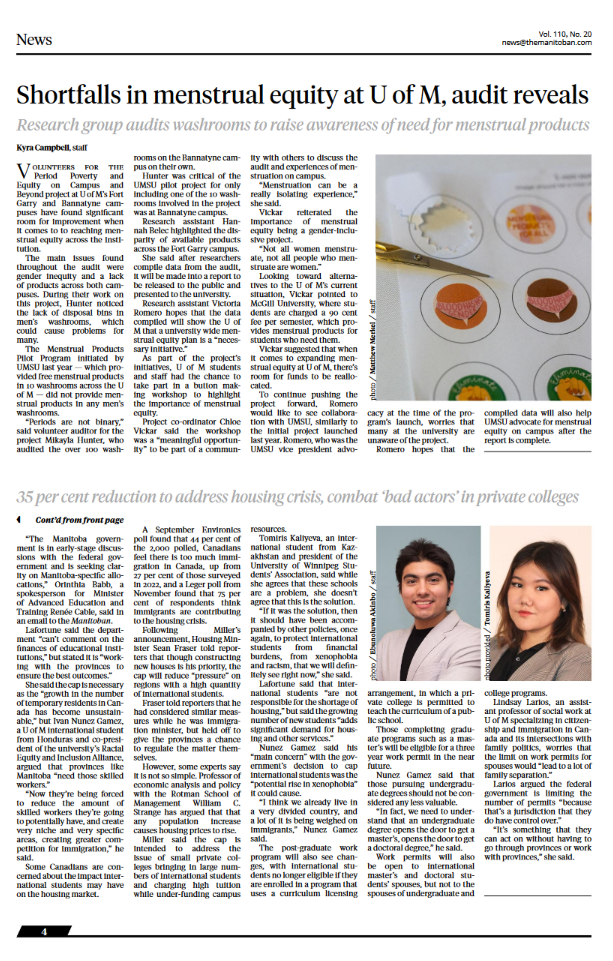
Kyra Campbell, reporter for The Manitoban, covered the work of the “Period Poverty & Equity, On Campus and Beyond” project, including the campus audit and the button-making event. Read more at The Manitoban!
Related Resources
Support Us
Whether you are passionate about interdisciplinary human rights research, social justice programming, or student training and mentorship, the University of Manitoba offers opportunities to support the opportunities most important to you.
What Could Harm Reduction Look Like in Manitoba?
April 20, 2023
Dr. Marcia Anderson, Tristan Dreilich, Dr. Shawna Ferris, Levi Foy, Shohan Ilsley. Introductions from Elder Margaret Lavallee and facilitated by Kohkum Leslie Spillett
Harm reduction is founded in public health, community, and social justice. Health, safety, and freedom from discrimination are all rights enshrined in Canadian, Indigenous, and international laws and protocols. They have also become highly politicized points of policy here in Manitoba – with sharp distinctions between urban and rural realities. The focus on political calculation rather than health and wellness has led to an increasing amount of neglect, hospitalizations, and deaths of fellow Manitobans – particularly in the wake of the COVID pandemic.
On April 20th, 2023, we hosted a roundtable to learn from practitioners, scholars, and advocates (and those who identify as a combination of all three) involved in harm reduction throughout the province. The event was co-organized by the Centre for Social Science Research and Policy (UM), the Centre for Human Rights Research (UM), Ongomiizwin, and University of Winnipeg’s Global College.

Fighting for Reproductive Rights: Resource Guide
July 19, 2022
Ha Bich Dong, Women's Health Clinic
On July 13, 2022 the Centre for Human Rights Research at the University of Manitoba hosted an informative, webinar roundtable discussion “Fighting for Reproductive Rights in 2022.”
This discussion brought together a variety of scholars and advocates – and those who identify as both – including Karen Sharma, Nahanni Fontaine, Kemlin Nembhard, Dr. Sarah Elvins, and Dr. Lindsay Larios, to provide context, information and solidarity as we move forward.
Related Resources
Support Us
Whether you are passionate about interdisciplinary human rights research, social justice programming, or student training and mentorship, the University of Manitoba offers opportunities to support the opportunities most important to you.
Fighting for Reproductive Rights in 2022
July 13, 2022
Karen Sharma, Nahanni Fontaine, Kemlin Nembhard, Dr. Sarah Elvins, Dr. Lindsay Larios
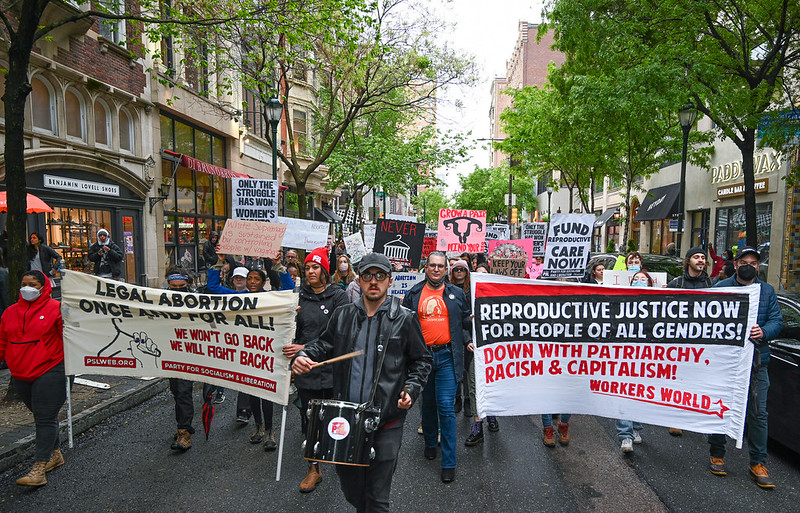
On July 13, 2022 the Centre for Human Rights Research at the University of Manitoba hosted an informative, webinar roundtable discussion “Fighting for Reproductive Rights in 2022.”
This discussion brought together a variety of scholars and advocates – and those who identify as both – including Karen Sharma, Nahanni Fontaine, Kemlin Nembhard, Dr. Sarah Elvins, and Dr. Lindsay Larios, to provide context, information and solidarity as we move forward.

Pride Month - A Conversation with Dr Jocelyn Thorpe
June 22, 2021
Dr. Jocelyn Thorpe, Kayla Lariviere
The Centre for Human Rights Research (CHRR) presents: Pride Month — A Conversation with Dr. Jocelyn Thorpe. June 22, 2021

Contact Us
We’d love to hear from you.
442 Robson Hall
University of Manitoba
Winnipeg, Manitoba
R3T 2N2 Canada
204-474-6453
Quick Links
Subscribe to our mailing list for periodic updates from the Centre for Human Rights Research, including human rights events listings and employment opportunities (Manitoba based and virtual).
Land Acknowledgement
The University of Manitoba campuses are located on original lands of Anishinaabeg, Cree, Ojibwe-Cree, Dakota and Dene peoples, and on the National Homeland of the Red River Métis.

